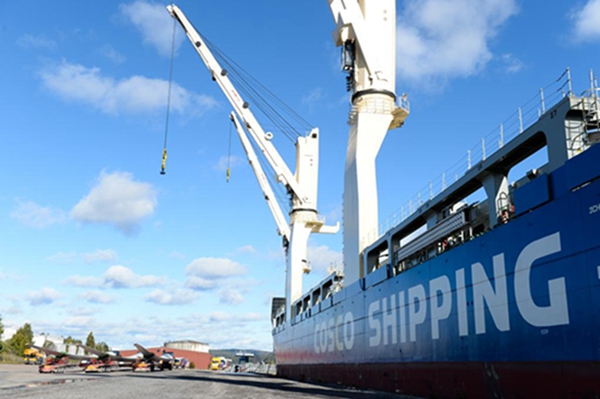|
Xinhua News Agency, Beijing, December 1: News analysis: Without the GSP certificate of origin, will exports suffer? Xinhua News Agency reporter Liu Hongxia Recently, a notice from the General Administration of Customs has attracted great attention in the industry. The announcement said: "Since December 1, the customs will no longer issue GSP certificates of origin for goods shipped to EU member states, the United Kingdom, Canada, Turkey, Ukraine, Liechtenstein and other countries that no longer give preferential tariff treatment to China." Some people believe that EU member states and other countries are canceling the most favored nation treatment to China, while others believe that this will impact China's exports. What's more, new economic and trade frictions arise from "brain compensation". What are the facts? 
Vehicles transport goods in the container terminal of Taicang Port, Jiangsu Province. Photographed by Xinhua News Agency reporter Li Bo Let's start with MFN treatment. Literally, "most favored nation" seems to mean a great deal of preference, but it is not. Most favored nation treatment is the normal trade relations treatment in modern international trade relations. At present, China's major trading partners, including all members of the World Trade Organization, have the most favored nation treatment relationship with China. Even if some countries impose tariffs on China in violation of WTO rules at some time, it has not reached the point where MFN treatment is completely abolished. Say "GSP" again. Compared with the most favored nation treatment, the meaning of "benefit" in the GSP is stronger and more substantial. Generally, developed economies can give developing countries tariff treatment such as GSP, and developing countries can also give each other preferential treatment. In this treatment, the beneficiary country can cancel it in due time according to the development of the beneficiary country, which is commonly referred to as "graduation" in the industry. The reporter learned from relevant materials that the EU (including the UK, which was still part of the EU at that time) and Turkey cancelled the GSP treatment for China on January 1, 2015. Canada, Switzerland and Liechtenstein cancelled on July 1, 2014. Ukraine cancelled the GSP treatment for China in 2012 earlier. In other words, the countries mentioned in this announcement have abolished the GSP treatment to China several years ago. It is reasonable to say that the impact on exports should have happened a few years ago. However, the fact is that China's foreign trade has maintained steady growth in recent years even though the GSP treatment has been abolished. In the first 10 months of this year, the total value of China's foreign trade import and export reached 31.67 trillion yuan, an increase of 22.2% year on year, 130 billion yuan higher than that in 2019. Cui Fan, a professor at the University of International Business and Economics, believes that the customs will not issue GSP certificates of origin this time, which is just a "technical treatment" of the customs. 
On September 15, 2018, COSCO Shipping's "Tianen" ship was unloading at the wharf in the port city of Heinesund in northeastern Sweden. Photographed by Liu Hongxia, reporter of Xinhua News Agency In fact, this is not the first time that the General Administration of Customs has issued a similar announcement. In an announcement in October, the General Administration of Customs decided not to issue GSP certificates of origin for goods shipped to Russia, Belarus, Kazakhstan and other three member countries of the Eurasian Economic Union from October 12, 2021. The announcement clearly stated that if the consignor of goods destined for the above countries needed the certificate of origin, he could apply for a non preferential certificate of origin. In China, the certificate of origin has been self printed, and a full set of application procedures can be completed without leaving home. The reporter learned that up to now, there are still three countries that have granted GSP treatment to China: Australia, New Zealand and Norway. Industry insiders believe that GSP certificates of origin may completely withdraw from the historical stage in the future. 
The staff of the "single window" of international trade in Xiamen area of Fujian Free Trade Zone accept business online. Photographed by Jiang Kehong, reporter of Xinhua News Agency In fact, thanks to China's signing of free trade agreements with more and more economies, enterprises can choose the most favorable tariff arrangement according to their own conditions. For example, China and Japan have established a free trade partnership through the Regional Comprehensive Economic Partnership Agreement (RCEP). After the agreement takes effect on January 1, 2022, enterprises can apply for certificates of origin under the RCEP and enjoy the corresponding agreed tax rate. Industry insiders suggested that enterprises should make full use of cooperation achievements such as the construction of free trade zones, improve the utilization rate of free trade agreements, constantly optimize the export market structure, and create new competitive advantages.
|